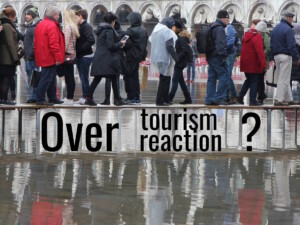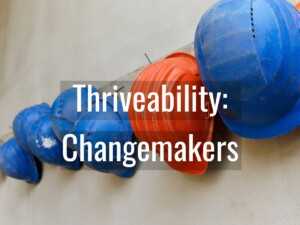Tourism’s democratic deficit

Travel & tourism’s host communities need alternative visions for development and the power to choose between them, according to lecturer and writer Jim Butcher. It’s his second “Good Tourism” Insight.
Ethical tourism is strongly associated with ‘community empowerment’ and ‘local participation’. But how does this relate to the important debates raging about national democracy: populism, majoritarian democracy versus group rights, direct democracy versus representative democracy, the role of expertise, and so on?
As a site-specific industry, tourism’s environmental and cultural impact — positive and negative — is an important issue. When communities democratically choose to limit tourism, this should be respected. Some cities, historic towns, small islands, and villages have experienced what has been described as ‘overtourism’, and their elected representatives have sought to enact measures to mitigate congestion and other associated issues. Limits on, for example, AirBnB and similar space-sharing apps, in cities all over the world are often positive examples of democracy at work.
Also see David Gillbanks’ “GT” Insights
“As we sit out COVID, let’s think about a fair & fail-safe cure for overtourism” and “Has ‘Future of Tourism’ failed host communities?”
But democracy requires choice, which in turn requires alternative visions. A presentism — judging how things are now, without a future-oriented sense of how they could be — often limits vision. While local communities are sometimes, often understandably, seen as victims of tourism development projects, they are far less often seen as victims of no development at all. In this respect, whilst many communities are concerned with ‘overtourism’, undertourism can be a bigger problem for many others.
A stark illustration is provided by Worldwrite’s Thinking Big video (see below) wherein a young Ghanaian man dreams of the jobs and opportunities that could arise from major economic development. He imagines a now deserted seafront transformed into the sort of mass tourism development often pejoratively associated with large Spanish resorts. When I showed this to an academic audience at an international conference on tourism some years ago, there was an audible gasp; who could possibly argue that such developments could be a good thing? Well, the young man in the video did. Watch for yourself (from 17 mins in, although the whole video is telling):
For all their faults, developments such as that dreamed of by the young man have played an important role in an overall positive story elsewhere. Julio Arramberri — former radical Left anti-Francoist, then Spanish tourism official, then university academic — puts it plainly enough. Referring to Mijas on the much (wrongly) maligned Spanish Costa del Sol, he said: “… construction and the tourism industry offered better living opportunities than tilling the fields in endless days of misery”.
Post-Franco, the people of Spain were able to vote for those who would address their “desire to have a better life in places where good schools and adequate health care would be provided”. In other words they had choices, borne of economic growth, enacted democratically, and facilitated by national policy.
The nation state vs the local community: A zero-sum game?
The sort of large scale development envisaged by the Ghanaian man can’t be conceived of through the prism of ‘local empowerment’ or ‘community participation’. It requires national planning and infrastructural development; the resources of the nation state. By its very nature — never local yet crucial in linking localities — national-scale infrastructure rarely features in discussions focused on community empowerment.
So it seems to me advocates of localism sometimes have it wrong. Yes, people find fault with tourism in their localities and want a greater say. But people are not only ‘local’ in their agency and aspirations, they are also national and international.
Yet national democracy is not always affirmed by advocates of community-based tourism and local empowerment. A popular book entitled Tourism for Development: Empowering Communities presents a zero-sum power struggle between the nation state and its communities. True development results only from the latter, according to the book’s author.
A Journal of Sustainable Tourism article worries that democracy won’t result in the ‘right’ decision — deemed to be degrowth and a relocalisation of tourism — because “growth is the logic of neoliberal capitalism and it is essential for democratic governments to get re-elected”. This treats electorates as determined by “the logic of neoliberal capitalism”, rather than as rational, democratic subjects. Democracy is reduced to “subservient governments” voted for by a “consumerised citizenry”.
Also see Jim Butcher’s first “GT” Insight
“Why tourism degrowth just won’t do after COVID-19″
Unfortunately for those who bemoan the complicity of democracy in ‘overtourism’, Brecht’s quip about dissolving the people and electing another is not an option.
There is a tradition of more broadly questioning the capacity of democracy to address what some consider environmental imperatives. William Ophuls in Ecology and the Politics of Scarcity (1977), and more recently in Plato’s Revenge: Politics in the Age of Ecology (2011), questioned whether voting populations were able to comprehend the damage wrought by their choices, and therefore whether they should be entrusted with them.
Ophuls argued that a Leviathan — a coercive state embodying the interests of the population but existing over and above them — may be needed. He also argued that small societies, close to nature, are better placed than liberal democracies to recognise and live within ‘nature’s laws’.
Human development has generally involved prioritising human needs, wants, and desires over ‘nature’s laws’; witness the sentiments of the Ghanaian man and the democratic choices of post-Franco Spain. But whatever outcome we’d like to see, we should affirm the value of any democratic rights we may have and wish them upon those whom have none.
Community empowerment is important in tourism, but it is limiting if championed outside of, or pitted against, national priorities democratically decided upon by citizens. It is the latter that potentially enables individuals to take a broader view of the kind of society, and the kind of development, they would like to see.
What do you think? Share a short anecdote or comment below. Or write a deeper “GT” Insight. The “Good Tourism” Blog welcomes diversity of opinion and perspective about travel & tourism because travel & tourism is everyone’s business.
Featured image (top of post): There’s more than one way. By geralt (CC0) via Pixabay.
About the author

Jim Butcher is a lecturer and writer who has written a number of books on the sociology and politics of tourism and is now working on a book about mass tourism. Dr Butcher blogs at Politics of Tourism and tweets at @jimbutcher2.





